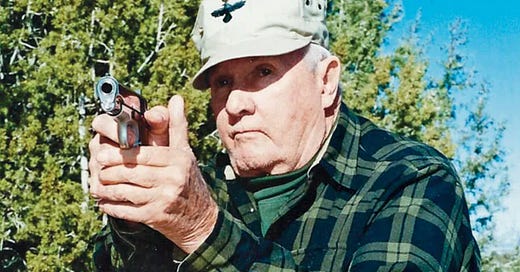“A smart man only believes half of what he hears, a wise man knows which half.”
Jeff Cooper
“A smart man only believes half of what he hears, a wise man knows which half.”
Jeff Cooper
Jeff Cooper, born on May 10, 1920, was an American Marine, firearms expert, and author, widely known for his influence on modern firearms training and self-defense techniques. He founded the modern technique of pistol shooting and emphasized the importance of mental preparedness and situational awareness in self-defense. Beyond his contributions to firearm training, Cooper was also known for his straightforward and often philosophical insights on various aspects of life.
In this quote, "A smart man only believes half of what he hears, a wise man knows which half," Cooper draws a distinction between intelligence and wisdom. The "smart man" in this context represents someone who has the discernment to not take everything at face value. This person understands that not all information is reliable or true, and thus exercises skepticism. However, simply being skeptical is not enough. This approach requires a further step to navigate effectively through information—identifying what is trustworthy and what is not. This is where wisdom comes into play.
The "wise man" takes this discernment to a higher level. Wisdom is not just about questioning or doubting; it’s about knowing how to evaluate, sift through, and understand the nuances of the information presented. A wise person has the experience, judgment, and intuition to distinguish between truth and falsehood, relevance and irrelevance. They know which "half" of the information they encounter is credible and useful. This requires a deeper understanding of context, a broader perspective, and an ability to read between the lines.
Cooper’s quote emphasizes that wisdom involves more than just intellect or the ability to process information. It involves insight, the ability to connect disparate pieces of knowledge, and an understanding of human nature. In a world overflowing with information, knowing what to believe—and what to dismiss—is a critical skill. This distinction is particularly relevant today, where misinformation and differing opinions are prevalent, and the ability to discern truth is more valuable than ever.
The quote also suggests that wisdom is earned through experience. While being smart might involve being well-read or knowledgeable, being wise involves having lived through situations where discernment was necessary, learning from those experiences, and developing the capacity to make informed judgments. Wisdom implies a certain humility and openness to learning, recognizing that not everything heard should be believed, and understanding the importance of questioning and verifying.
In summary, Jeff Cooper’s quote highlights the difference between being smart and being wise. A smart person recognizes the need for skepticism, while a wise person has the insight to know what part of the information can be trusted. It emphasizes the importance of discernment and the skill of critical evaluation in navigating a complex world. Ultimately, wisdom involves the deeper understanding that comes from experience, judgment, and the ability to see beyond the surface of what is presented.




